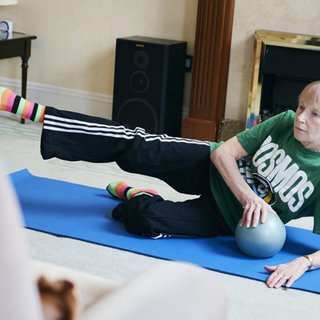Emma P's story
How I cope with mental fatigue
Emma, 32, was diagnosed with a myelodysplastic syndrome (MDS), in 2011. She has had four rounds of treatment, including two stem cell transplants and chemotherapy, but is currently in remission.

Emma, 32, was diagnosed with a myelodysplastic syndrome (MDS), in 2011. She has had four rounds of treatment, including two stem cell transplants and chemotherapy, but is currently in remission.
iI found that after chemotherapy it took a long time to get my concentration span back – my brain just doesn’t whir at the same speed as it used to. It doesn’t even have to be anything particularly challenging, just trying to watch a more complicated film can be difficult for me.
Some people use the term 'chemo brain', but I think of it more as 'fatigue brain'. The chemotherapy makes you physically fatigued, which gives you fatigue brain. The more tired I am, the harder it is to concentrate on things.
My head feels a bit like cotton wool at times and my memory is nowhere near as good as it was.
Coping with mental fatigue at work
I work in insurance pricing, which can be quite mathematical. Some people do puzzles and Sudoku to keep their brain active, but my work is enough of a puzzle!
When I’m listening to people at work, I don’t always retain the information and it takes me a lot longer to process – you can almost hear the cogs whirring. When I can, I try to take the information away, to give myself a bit more processing time. I’m getting better at writing things down. I have also got better at asking questions. That can be tough when you have already asked the question, and I hope that people aren’t bothered by it. I set aside some time with my manager to explain why I need to ask more questions.
When I was having treatment, I tended to be by myself, or with my medical team or family. It takes different skills and brain power to talk to friends and work colleagues – I often end up not knowing the right words to say or muddling-up words.
In the early days it helped to limit visits from people to just a short amount of time, rather than spending the whole evening with people. It also helped to recognise the times when I was less tired and more mentally alert – probably about 11 o’clock in the morning is my best time – and I am not really an evening person either.
I have only just been able to enjoy social stuff a bit more – it’s just generally improved as I’ve got less fatigued overall, and I also think it’s connected to my mood as I have been battling with depression over the last six years.
Teaching yoga
I’ve been back teaching yoga, but even now I can get muddled up – I end up pointing to my shin and calling it a knee!
In the old days I used to be able to wing it, but now I have been making myself prepare, writing notes and studying for my yoga classes. I find that helps with my memory and to give the class a focus.
Now when I am explaining things, I try and pause and be silent if I have forgotten something, rather than just spilling out the words.
Giving my brain a break
Thinking little and often helps. Because I know that my concentration span isn’t good, I give myself breaks. I try to do tasks in short bursts and avoid activities where I would need to concentrate for a whole hour.
Outside of work I do need some downtime. I find that meditation helps – the focus of not focusing. They call it meditative rest. I can be a bit of an anxious person, so doing some meditation before bed helps wind my mind down.
I’m also into crafting – knitting, crocheting and cross stitch. They’re relaxing activities but they keep my brain working a bit more than just watching TV.
Keeping my mind and body active
If you can improve your physical fitness it’s a massive help. If I’m having a sluggish brain day, it helps to just get outside. At work I go for a walk every day at lunch. It clears my head.
For me, being more physically active means I am getting fitter and I have more energy.
But I also must make sure I don’t push it too far, as I can go the opposite way and do too much. It’s about getting the balance right.
Sometimes just doing gentle stretching and moving around at home – nothing too intense – can have a positive impact on my body and mind.
Mood and fatigue connection
I think depression can be a massive part of mental fatigue – I can get that pure brain fog, where I can’t do anything. I have gone through periods where I just sit there and stare at stuff.
I have been seeing a Macmillan therapist and I talk to her a bit about the mental fatigue. She’s suggested a few practical tips to help with returning to work like planning in breaks. But she has mainly helped me start to accept the fatigue, and not be so hard on myself about it.
My advice to others is to give yourself a break – you can find coping strategies but also don’t beat yourself up about it.
Simple things, like going for a walk with my dogs, really cheer me up. Having my two dogs, Alfie and Jasper, has changed my life. It’s improved the atmosphere around the house and getting out and walking them, getting that fresh air, that is so different from going to the gym. They’re both a bit bonkers – but they make me smile every day!
Janssen-Cilag Ltd has supported Blood Cancer UK with funding for the production of this web page and others within the ‘Living well’ section. It had no influence over the content.

Share your story about living well
Your experience can help others with blood cancer



